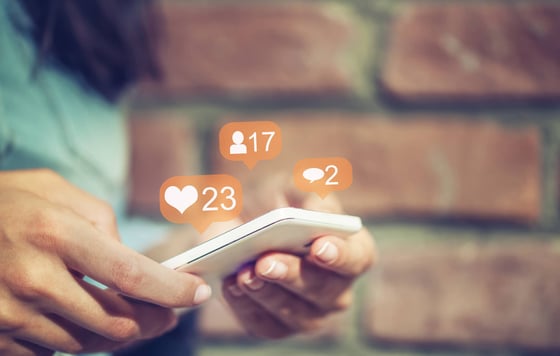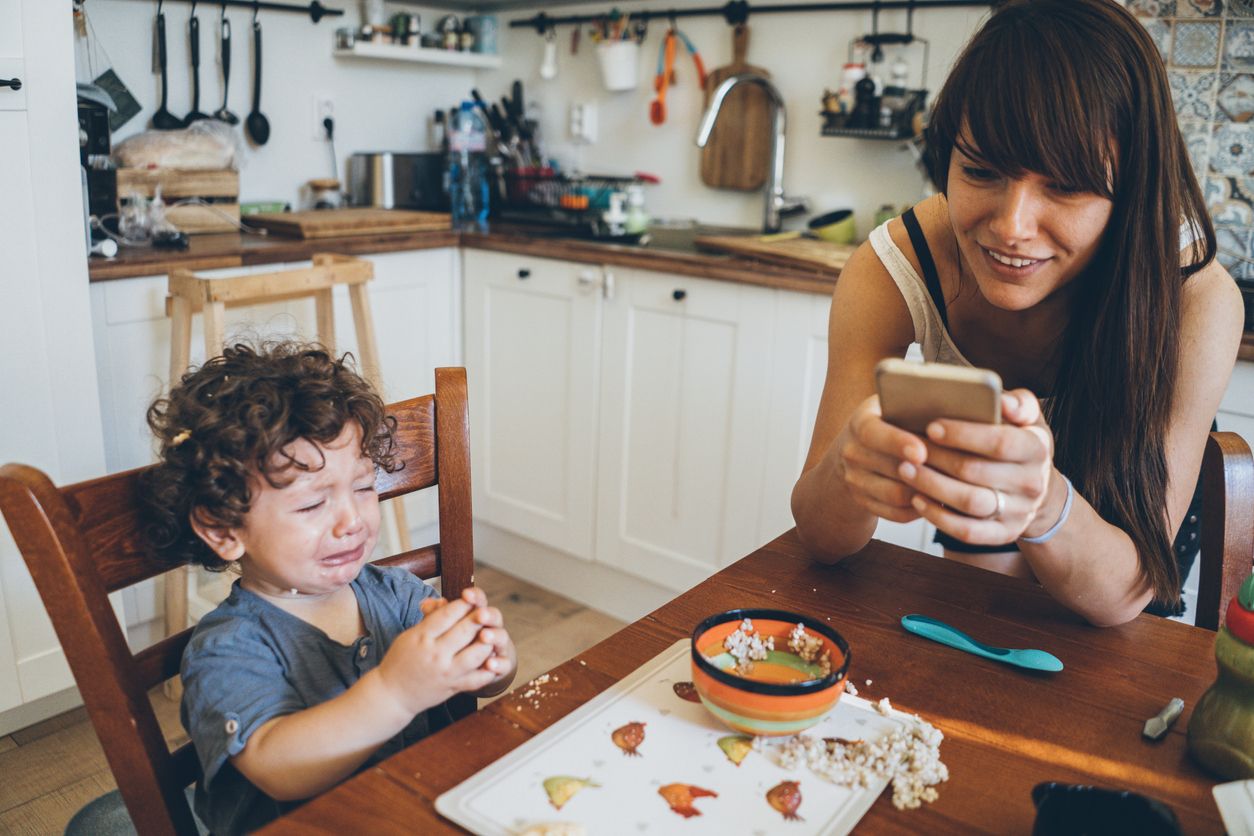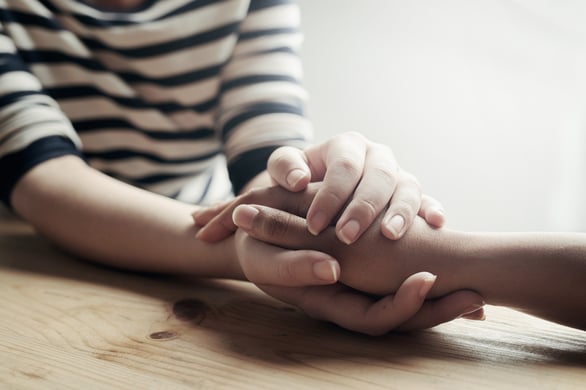Every day, we have more and more ability through technology to stay connected no matter where we live in the world. But each day, many of us lack empathy in our lives and feel more and more alone.
It’s counterintuitive—but the statistics don’t lie.
Estimated reading time: 5 minutes

How Technology Affects Mental and Emotional Health, Relationship Quality,
and True Connection: The Statistics
Depression is rampant.
Hope for Depression says depression affects over 18 million in any given year—that's one in ten!
If you've ever been in a relationship with a person in depression, you know how difficult connection is! I've coached many people who felt swallowed up by depression.
Technology addiction is now being linked as a component of depression.
It's possible you're in a relationship with someone who has an addiction to technology. Perhaps your teenager is struggling with screen addiction.
Among teens, the more screen time they report, the higher their rate of depression. Suicide rates in all age groups are up. Every 12 minutes, someone in the US commits suicide. Tragic.
These are not the marks of a genuinely interconnected society.
It's time to get kids off of phones and back in nature!
Many say that we’re more connected than ever...
Are we?
Time to reassess our interactions and why so many people feel a sense of loneliness even though technology has made it easier than ever to communicate.
Let’s take a closer look at what’s really going on in our society—and especially at how our children and teens are affected.
Technology Use and Its Impact on Our Culture
Social media and the ease of technology give us the illusion of connection—but at the same time, we have fewer in-person encounters.
Add fake news and false social media posts coupled with AI regurgitation, and we have a regular diet of garbage that does anything but create authentic communication and connection between humans.
Why is face-to-face so important?
Face-to-face interactions are critical for developing infants; it's how they develop language and learn to understand and interpret the world. And why would the need for contact be any less important for all developmental years?

Of course, reading body language is crucial for leaders in the workplace, too, and foundational for building healthy relationships and cultivating emotional intelligence.
Why else would our brains have mirror neurons to help us empathize and connect?
Is Technology Destroying Empathy?
Personal connection has sharply decreased in Generation Z (those born between 1994 and 2004).
Why is this information significant?
These are members of a generation that grew up on smartphones, gaming, surfing the net, and learning new things from YouTube.
So, what's the downside?
A study titled, "The Social Cognitive Effects of Digital Technology on Teenagers" states:
"One striking negative effect of digital technology consumption is how it diminishes our capacity for empathy by limiting how much people engage with one another. The addictive qualities associated with digital consumption and cyber usage are gaining prominence as a serious concern." (emphasis mine)
The values of the next generation were previously shaped by parents, grandparents, and teachers.
Not anymore!
That crucial mentoring role is now filled by digital algorithms that choose what children see—algorithms that have no morality, no values, and no filters other than popularity.
Popularity is determined by how many likes you get on social media platforms.
Combine those algorithms with parents’ lack of time to spend with their children and teens, and you see many teenagers floundering or turning to peers for support.
As for parental monitoring—how can a parent monitor children’s use of the instantly disappearing photos on Snapchat?
So, as our “connectedness” goes up, our capacity for empathy goes down, and so does our heart-felt interconnectivity.
A lack of empathy and compassion creates an object-centric society void of true connection.
Symptoms of a Lack of Empathy
What are the symptoms of a lack of empathy?
Just as you know when food has spoiled, there are certain characteristics of a person lacking empathy.
Here are the most common traits:
- Unable to truly listen, but may pretend to listen
- Minimizes or dismisses others' perspectives and experiences
- Feeling stuffers are used regularly
- Lack of awareness of others' emotions
- Unable to interpret expressions and body language
- Insensitive to the needs of others
- Gets frustrated with others easily
- Can have difficulty connecting in relationships
- Critical and demanding of others
- Inordinately self-absorbed

The Numbing Effects of Social Media: Empathy IS the Solution!
Social media demands very little of us—no social intelligence, no emotional intelligence, no meaningful connections.
It often lacks social conscience. It’s very easy for anyone to fall into an addiction to technology, whatever their age.
The instant gratification of social media leads us away from the uncomfortability required for growth and real and meaningful relationships, first with ourselves and then with each other.
Why?
Reasons Why Tech and Social Media Can Prevent True Connection
Most people haven't connected the dots of the gradual decline of our inability to connect with one another. Research is in its infancy regarding the effects of the technological age on child development and relationships.
Below are common reasons technology and social media can hinder empathy and our connection to each other. Their sheer differences in how much energy, time, and presence is required are startling.
Relationships are unpredictable.
Connected relationships often involve emotional upsets, conflicts, and differences.
Our kids need us when it's inconvenient.
Our spouse's car breaks down, and they need a ride. Our neighbor's car won't start on a cold winter morning and ask us to help them. Our parents are elderly and need us to help.
Instead, social media is predictable; there's always something to read or post.
It's easier and much more entertaining to turn to social media with its endless opportunities for “friendship,” "likes," and funny TikTok videos than to make a loving effort in a relationship.
Real relationships are inefficient.
Social media is efficient and fast.
We get likes and make connections that appear to give value.
However, the digital world is indifferent to you personally. It creates very little relevant meaning in relationships unless the real relationships are nurtured.
Our social bonds are critical, rewarding, and meaningful but are inefficient and sometimes troublesome, requiring understanding and empathy.
As Psychologist Frank Pittman says, "It's true that families can drive you crazy, but they can also love you sane."
Real relationships require work and investment of caring and time.
Social media is easy, instant, stimulating, and gratifying, like a game of mindless solitaire.
Going online doesn't require making an effort to understand others. It doesn't require us to be uncomfortable or present with another person's emotions or challenges.
Even though someone may disagree with you on social media, all you have to do is unfriend or block them!
It's much more challenging to have a loved one adamantly disagree with you face-to-face and be able to stay open to new ideas, truly listen, find common ground, and have an intelligent conversation.
After all, you can find plenty of people online who agree with your opinions and don’t require you to stretch and grow.
In real life, people are not always available.
In real life, people have multiple responsibilities; therefore, people are not always responsive, even though they may care very much about you.
Social media is always available, 24/7.
There's always someone or something there to interact with. There’s always someone to talk to online, so you’re not disappointed.
When I've coached couples, sometimes, their partner expects an instant response to a text, even though their spouse is at work. This expectation can stem from the culture of instant gratification that we live in.
In real life, there are consequences and feedback when people hurt us or we hurt them.
 If we care about the person, a resolution, repair, or at least a conversation is necessary.
If we care about the person, a resolution, repair, or at least a conversation is necessary.
If you’re online and you or someone else does something hurtful, they often don’t face any consequences.
Take cyberbullying, for example. A bully doesn't have the benefit of seeing the devastating consequences of their actions. The prevalence of a lack of accountability is disconcerting.
It's much more difficult to shun a loved one living in the same house or a co-worker you see every day! These relationships provide feedback on how our words and actions affect others for better or worse.
Online, we can just click a button and switch to a different channel. When texting, just ghost the person and don't answer. I've worked with individuals who were in serious relationships (lasting one year or longer) where their partner just stopped communicating, calling, or texting. No conversation, no resolution.
Real relationships often don't offer instant gratification or constant stimulation.
Instead, healthy relationships demand quality time, sincere listening, and empathy.
Feeling understood is a basic human need.
Technology has contributed to an addiction to immediate gratification and constant stimulation. However, they are NOT basic human needs. They are learned needs, like the need for a drug or alcohol.
This tech convenience brings us back to the need for empathy.
To develop a capacity for sensing and understanding another's feelings, we need to experience our impact on others.
Emotional literacy is a prerequisite to tuning into the feelings of others. We need to pause, accept, and acknowledge our own emotions before we can be present to others.
Related reading: "The Three Kinds of Empathy: Emotional, Cognitive, and Compassionate."
What Does Empathy Mean, Anyway!?
Empathy is the ability to truly be present. It's the ability to hold a safe space for others to feel their own emotions completely and to be able to understand their experience so they can take effective action to return to a place of peace.
As described in Heartmanity's article "What Is Empathy and Why Is It Important?" the four qualities of empathy are outlined as the abilities:
- to be able to see the world as others see it
- to be nonjudgmental
- to understand another's feelings
- to communicate an understanding of that person’s feelings
Compassionate empathy creates genuine connection and jumpstarts actions of caring and support. With empathy, there is a resonance between people, a bridge of understanding that strengthens trust.

Is a Lack of Empathy Destroying Our Interconnectivity?
In a word, yes.
Empathy is a vital key if we hope to build bridges with others, bridges between our differences.
Empathy is the healing salve and binding glue. It calms and nurtures. Without it, our relationships and our communities suffer.
Empathy is the ability to feel another's hurt and say you're sorry.
Let’s take a step back and choose the intentional road of meaningful connections—real relationships!
Seek to understand others.
When we express care for one another, no matter our differences, we build strong bridges that will be the beginning of healing and greater unity for all. Connection with others allows us to connect, help, and support one another. Empathy is crucial for our interconnectivity.
Then, the use of social media and other technologies will support that real human connection, not detract from meaningful relationships or act as a substitute for them.
Social media is not the problem. Our choices create the outcome.
Choose the intentionally!
For personalized support from a seasoned relationship strategist and emotional fitness coach, contact us at Heartmanity or check out our empowerment courses and products.










